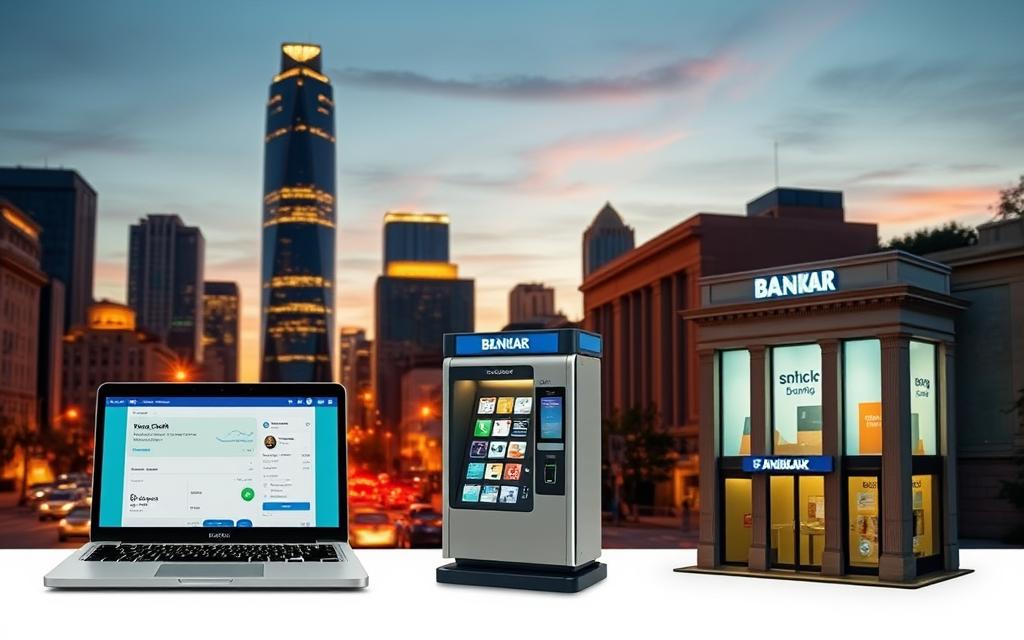Advertisement
Did you know that in 2021 worldwide remittances went beyond $700 billion? This shows the huge impact of sending money across borders. In today’s world, knowing how to send money to your home country is crucial. People living abroad and their families depend on international money transfers for support.
The task of sending money home can seem complex. But with the right info and choices, you can send your money where it needs to go. And you can do it quickly and without much trouble.
Understanding International Money Transfers
International money transfers are key for people and businesses needing to send money abroad. This process includes different steps than domestic transfers. Knowing these steps helps make smarter choices when sending money to another country.
What is an International Money Transfer?
Sending money from one country to another is called an international money transfer. It usually involves different currencies and banking systems. It’s important to understand the details because international transfers are more complex than local ones. They often need navigating various banking rules around the world.
Key Terminology Explained
It’s important to know certain terms for international money transfers. Some key ones include:
- Remittance: Money sent by workers abroad to their home country.
- SWIFT Codes: Special codes that help move money between banks globally.
- Processing Times: How long it takes for the money to move from the sender to the receiver. This can change based on the method used.
Importance of Understanding Fees
Knowing about fees with international transfers can save money. Many services have clear fees, but some have hidden costs. Before sending money, look at all the fees to find the cheapest way to send money abroad.

Popular Methods for Sending Money
Looking into different ways to send money across borders is key. There are various options out there, each with its pros and cons. We’ll discuss three big ones: bank transfers, online services, and mobile apps. All these methods aim to send money efficiently, taking into account ease of use and costs.
Bank Transfers
Bank transfers are a trusted method for many when sending money home. They are seen as safe since the transaction is between banks. However, they do have higher fees and take longer, which might not work for urgent needs. Still, the trust and security traditional banks offer make this a preferred choice for some.
Online Money Transfer Services
Online transfer services are becoming a favorite due to ease and affordability. Companies like PayPal, TransferWise, and Western Union offer fast and cost-effective ways to send cash abroad. They eliminate the need to visit a bank, making the process smooth. Their simple online interfaces attract those who are comfortable with technology.
Mobile Apps
Mobile apps, like Venmo and Cash App, are changing the game for money transfers. They allow for quick sending with just a smartphone. Users love the speed and convenience these apps offer. As more people use digital wallets, mobile apps are leading the way in how we manage our money.

Comparing Fees and Exchange Rates
When sending money abroad, it’s key to know about transfer fees and exchange rates. These can change how much it costs to send money home. Some services have set fees, while others take a percent. It’s smart to look at these costs with different services.
Understanding Transfer Fees
Transfer fees differ a lot based on the service used. Western Union might ask for a fixed fee. At the same time, Wise (formerly TransferWise) often charges a percent. The fee can depend on how much you’re sending and where it’s going. It’s important to check these fees.
Exchange Rates Explained
Exchange rates affect the value of your money in another currency. They change with market conditions and differ across services. Some might offer good exchange rates, while others add extra charges. Watching exchange rates helps you get more for your money.
How to Find the Best Rates
To get the most from your transfers, regularly compare services. Websites for comparing rates can show you fees and rates fast. Create a list to compare fees, rates, and how quick the transfer is. This approach helps you find the right service for your needs.
Security Measures in Money Transfers
Sending money across borders should always be safe. Choosing well-known services affects the security of your money and personal info. Knowing how to keep your details safe is key because scams are common today.
Identifying Reputable Services
When picking a service for money transfers, check if they’re reliable and credible. Look for companies with good reviews and that follow the rules. Services like PayPal, Wise, or Western Union are known for being trustworthy. Checking these things helps you make smart choices and keep your money safe.
How to Protect Your Information
Keep your personal and money details safe in several ways. Always use strong passwords and turn on two-factor authentication if you can. Keep your software updated and be careful with your sensitive info online. Protecting your details this way makes you feel safer when you send money abroad.
Signs of a Scam
Knowing scam signs can help you avoid losing your money. Watch out for unexpected messages with offers that seem unreal or ask for money. Remember, real services won’t ask for your private info by email. If something feels off, check it through trusted ways. Knowing what to watch for helps you stay safe from scams in money transfers.
Tips for Sending Money Efficiently
Being smart about sending money means looking at different factors. You’ll need to think about costs, how fast it goes, and if it’s easy to do. Also, knowing when to send money can save you a lot, since fees and exchange rates change a lot. If you need to send money quickly, it helps to know what could slow things down.
Choosing the Right Method for Your Needs
Picking how to send money depends on what you need. There are many ways to do it, from using banks to handy mobile apps. You should think about:
- Cost: Prices vary a lot, so pick what works best for your budget.
- Speed: Some ways are quick, while others take more time.
- Convenience: It’s important to choose something that’s easy and available for you.
Timing Your Transfers
When you send money can really change what the receiver gets. Conditions in the market can make rates go up and down. Watching these changes can help you pick the best time to send money. For example:
- Transfers during less busy times may have lower fees.
- Sending money at the start of the week might get you better rates.
Last-Minute Transfers: What to Consider
If you’re in a rush and need to send money quickly, keep a few things in mind. It’s important to choose a service that’s known for being fast and reliable. Doing some background checks can prevent delays. Keep these points in mind:
- Look into any limits on how much you can send.
- Know when the last chance is for sending money the same day.
- Make sure the service can get your money to where it needs to go fast.
Frequently Asked Questions
If you’re new to sending money internationally, it’s crucial to understand the basics. We’ve gathered common questions to help both newcomers and those familiar with the process. These FAQs aim to clear up any confusion and assist you in making wise choices.
How Long Does it Take to Send Money?
The time it takes to send money abroad varies. Bank transfers usually need three to five days. Yet, services like PayPal or TransferWise are much quicker. The speed also depends on where you’re sending it, the banks’ working hours, and if there are other banks involved.
Are There Limits on Transfer Amounts?
Yes, most sending services have limits on how much you can send. Western Union may let you send up to $10,000 each day. PayPal could have different limits for some accounts. It’s wise to check these limits before making a transfer to avoid issues.
Can You Send Money to All Countries?
Not every service lets you send money to any country. Some places can’t be sent money due to laws or financial rules. Companies like Wise or Remitly will show you where you can send money. Knowing which countries are supported helps you plan better and avoid delays.



